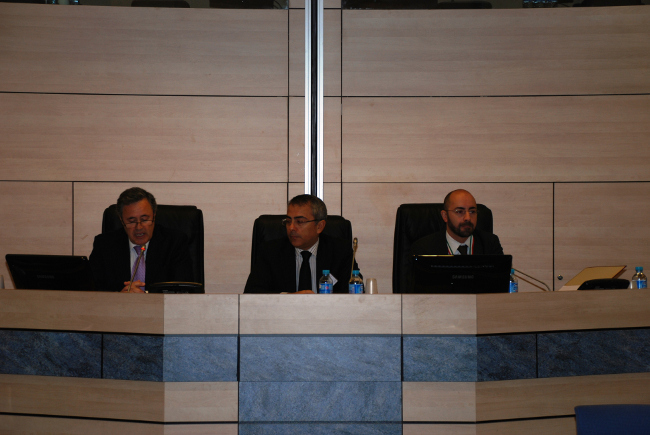Paris (France), 27 February 2013
Member States and International Organizations of the ICAO European Regional Aviation Safety Group (RASG-EUR) agreed today to establish an expert safety team to support the development and implementation of safety enhancement activities in the part of the ICAO EUR Region which is not covered by the regulatory framework of the European Union (EU)/European Aviation Safety Agency (EASA).
This new safety team, named ICAO EUR-Regional Expert Safety Team (IE-REST), will count on the dedicated work of members who will serve as focal points for introducing safety enhancement initiatives and activities within their respective States or organizations and, in the case of representatives of civil aviation authorities, for supporting their Government’s efforts with industry.

(see full size picture)
Form left to right: Luis Fonseca de Almeida, Regional Director of the ICAO European and North Atlantic Office, Mr Haydar Yalçin, Deputy Director General of the Turkish Civil Aviation and Chairman of RASG-EUR/2 and Nicolas Rallo, ICAO EUR/NAT Safety Officer and Secretary of the ICAO EUR-Regional Expert Safety Team (IE-REST)
The decision to establish the IE-REST was taken on the occasion of the second meeting of the RASG-EUR (RASG-EUR/02) which was held in Paris on 26 and 27 February 2013 in the premises of the ICAO European and North Atlantic Office (ICAO EUR/NAT).
RASG-EUR/02 was chaired by Mr Haydar Yalçin, Deputy Director General of the Turkish Civil Aviation, and attended by more than 80 representatives from 33 Member States and 12 International Organizations, including Airports Council International (ACI), the Civil Air Navigation Services Organization (CANSO), the European Aviation Safety Agency (EASA), the European Civil Aviation Conference (ECAC) , the European Commercial Aviation Safety Team (ECAST), EUROCONTROL, Flight Safety Foundation International (FSFI), the Interstate Aviation Committee (IAC), the International Air Transport Association (IATA) , the International Civil Aviation Organization, the International Coordinating Council of Aerospace Industries Associations (ICCAIA) and the International Federation of Airline’ Pilots Association (IFALPA).
“It is of paramount importance that the communication link between global/regional inputs and local implementation be the shortest and most effective possible to ensure that no safety improvements and potential life-saving measures get watered down through the communication process itself,” said the EUR/NAT Regional Director, Luis Fonseca De Almeida, in his opening speech. “We have to do everything possible to enable the various stakeholders in our Region, who operate in different geographical areas, with different legal and operational environments, to achieve the same high level of safety,” he added.
“The work of the RASG-EUR is data driven, risk based, and result oriented. Within this framework, the priority of the IE-REST team of experts is not to ask States to provide detailed, time-consuming reports on their achievements but, based on the many sources of information available to the team, to directly provide States and the industry with what is needed to enhance aviation safety,” said Nicolas Rallo, the ICAO EUR/NAT Safety Officer who will serve as the IE-REST Secretary. “With regard to the State Safety Programs, for example, the priority of the experts will be to provide States with the information bricks needed to build up their SSP house and not to check the advancement status of the SSP construction site, which is more an auditing kind of task,” he added.
Membership of the IE-REST shall include various representatives from the relevant State aviation authorities competent in different aviation domains plus representatives from regional/international organizations, air operators, service providers, manufacturers and industry organizations. This will ensure that safety activities are performed through a coordinated effort.
Besides the creation of the new contributory group, on the occasion of its second meeting the RASG-EUR took other important decisions such as the approval of priorities for the IE-REST work programme and increased coordination and cooperation with other existing teams in the region, in particular ECAST.
The RASG-EUR, which is the Regional Safety Group having competence on the ICAO EUR Region, met for the first time last year on the 23 and 24 of January. It is the only comprehensive aviation safety forum covering the whole ICAO EUR Region and aims at fostering coordination and cooperation between all aviation safety stakeholders. RASG-EUR will convene again for two days during the last week of February 2014.
